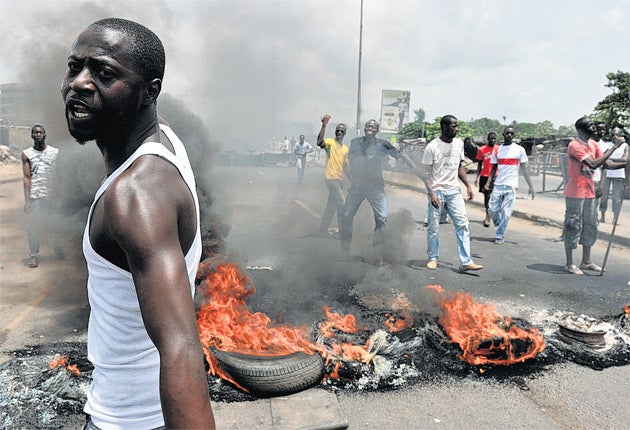Six women shot dead at protest as 'illegal' Ivorian leader clings on
Troubled West African nation sliding back towards another civil war.

Your support helps us to tell the story
From reproductive rights to climate change to Big Tech, The Independent is on the ground when the story is developing. Whether it's investigating the financials of Elon Musk's pro-Trump PAC or producing our latest documentary, 'The A Word', which shines a light on the American women fighting for reproductive rights, we know how important it is to parse out the facts from the messaging.
At such a critical moment in US history, we need reporters on the ground. Your donation allows us to keep sending journalists to speak to both sides of the story.
The Independent is trusted by Americans across the entire political spectrum. And unlike many other quality news outlets, we choose not to lock Americans out of our reporting and analysis with paywalls. We believe quality journalism should be available to everyone, paid for by those who can afford it.
Your support makes all the difference.Security forces shot and killed at least six women protesters in Ivory Coast's commercial capital Abidjan yesterday, witnesses said, raising concerns that protracted post-election violence is escalating into civil war in the West African nation.
The United Nations says the death toll since November's disputed presidential poll is at least 365. That figure is widely believed to be an underestimate, with government forces reluctant to announce their own casualties.
The women were protesting against the incumbent President, Laurent Gbagbo, in the Abidjan suburb of Abobo, which voted in favour of Alassane Ouattara, the internationally acknowledged winner of the election. Mr Gbagbo is refusing to step down.
Idrissa Diarrassouba, a witness, told Reuters news agency: "Men in uniform drove up and started shooting randomly. Six women died on the spot. They were all shot and the other women are crying." Moussa Fofana, a teacher, added: "I'm standing next to a body right now, with a bullet hole in her neck."
Mr Gbagbo is clinging to power because he still controls the Ivorian army. Last month, an Abobo-based group ambushed government soldiers and the President sent his security forces into the neighbourhood, using mortars and seeking revenge. The UN said at least 26 people have died and 200,000 have fled from the fighting in Abobo.
"The most likely scenario in the coming months is armed conflict involving massive violence against civilians, Ivorian and foreign alike, that could provoke unilateral military intervention by neighbours," the Brussels-based International Crisis Group said yesterday.
Ivory Coast, the world's largest cocoa producer, was once a bastion of stability in a troubled region. Under the lengthy albeit autocratic rule of Félix Houphouët-Boigny, who held power from independence in 1960 until his death in 1993, the country was a favoured expatriate posting. Skyscrapers sprouted in Abidjan, even after Mr Houphouët-Boigny moved the official capital to his birthplace, Yamoussoukro.
But a civil war in 2002-03 caused instability, leaving the former French colony split between a government-controlled south and a north loyal to the Forces Nouvelles rebels. The election last autumn was meant to usher in a new period of peace. International organisations, the United States, Britain and France all affirm Mr Ouattara as the winner. But Mr Gbagbo claimed a contested decision by the country's constitutional court, its highest legal body, to annul more than 10 percent of votes cast makes him the real winner.
With Mr Gbabgo refusing to budge, Mr Ouattara has established his headquarters in an Abidjan hotel, ringed by UN peacekeepers. With two separate administrations contesting each other's legitimacy the economy has fallen into paralysis. Foreign firms and capital have departed, banks have shut and violence has broken out in the countryside as well as the political tinderbox of Abidjan. About 70,000 Ivorians have fled to neighbouring Liberia, raising fears that the instability could spread. There are reports of mercenaries, veterans of Liberia's own civil war, crossing in the other direction looking for work.
Now worldwide cocoa prices have rocketed; on Thursday they reached a 32-year peak of $3,726 per tonne. In another development that added to the misery of Ivorians, electricity and water supplies to the rebel-dominated north have been cut off. With the crisis now in its fourth month, there has been no shortage of diplomatic attempts to solve the impasse. Delegations of other West African leaders have repeatedly descended on Abidjan, but so far they have failed to find a resolution.
Earlier suggestions that ECOWAS – the economic community of West Africa States – might deploy troops to oust Mr Gbagbo have foundered too, due to the reluctance of key members. Such a deployment would also be unprecedented. Ecowas did deploy troops in the 1990s, notably to Sierra Leone and Liberia. But those missions descended on existing civil wars, rather than attempting to decapitate a regime that has the support of its own military.
The Ecowas Monitoring Groups, or Ecomogs, as the earlier missions were known, did not always acquit themselves with honour either. In Liberia, residents of the capital, Monrovia, ruefully christened it, "Every Car Or Moving Object Gone" due to the light fingers of the light infantry deployed to "protect" the people of the Ivory Coast.
Flights of fancy
In an embarrassing volte-face, a senior UN official has apologised for claims made by the Secretary-General this week that Belarus had illegally armed the Gbagbo regime with attack helicopters. Alan Le Roy, the UN's peacekeeping head, said that, contrary to Ban Ki-moon's assertion that the helicopters had been flown to the Ivory Coast by the government in Minsk, there has been no delivery. "I must admit the report from the mission... was a mistake," he said. Mr Le Roy said he had apologised to officials from Belarus. Reuters reported that the intelligence behind the claims came from US sources.
Join our commenting forum
Join thought-provoking conversations, follow other Independent readers and see their replies
Comments